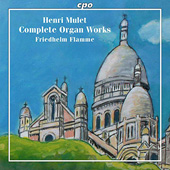

Esquisses byzantines
- No. 1 - Nef
- No. 2 - Vitrail
- No. 3 - Rosace
- No. 4 - Chapelle des Morts
- No. 5 - Campanile
- No. 6 - Procession
- No. 7 - Chant funèbre
- No. 8 - Noël
- No. 9 - In Paradisum
- No. 10 - Tu es petra et portæ inferi non prævalebunt adversus te
Méditation religieuse
Angélus
Petit offertoire
Sortie douce
Prière
Offertoire funèbre
Offertoire pour la fête du très Saint Rosaire
Carillon-Sortie
French composer/organist Henri Mulet (1878-1967) forms an important link within the long dynasty of French composers affiliated with the organ. He was a student of Charles-Marie Widor and the teacher of Gabriel Fauré, but yet to this day he remains but a faint footnote in the historical annals of music. Could it be because he published a paper in 1922 criticizing modern organ builders that was titled: "The anti-religious attributes of the modern organ", which most likely created enemies who blacklisted his name and boycotted his music. Not long after this he destroyed most of his manuscripts and left Paris. He became organist in a small town where he lived out the rest of his life in obscurity and poverty.
Most of his pieces are of a quiet and reflective nature, well suited for musical interludes, prayers and postludes within church services and funerals, and all are marked by close attention to detail and harmonic progression uniquely of his own design, with some exceptions like Noël from the Esquisses byzantines which sounds a bit more fanciful. And then along comes Tu es petra et portæ inferi non prævalebunt adversus te (You are rock and the gates of hell will not prevail against you). A work of such magnitude that it rivals, in my humble opinion, any of the great Postludes or Toccatas by the masters, and is sure to challenge even the best organists. All the way through as both hands rhapsodize freely at top speed, both feet proclaim the main theme on the pedalboard, all of which comes to a grand and powerful conclusion.
German organist Friedhelm Flamme is obviously a prolific completist as he has recorded all the organ music of Duruflé, Bruhns, Lübeck, Praetorius, Tunder, Hasse, Böhm, Scheidemann, Weckman and quite a few more, along with some of the organ works of Langgaard, Nielsen, Mendelssohn, Reger and Liszt, all on the CPO label. I guess it's safe to assume that he knows organ music and how to project it well by suitable use of the instrument's registration and expressive and animated playing. It would seem that the Abbey church of Bad Gandersheim in Lower Saxony has had an organ in place since the 1400s, but many alterations and replacements over time have proven unsuitable. A new organ by the Mühleisen firm of Strasbourg was built, and dedicated on Easter Sunday of 2000. It features approx. 50 stops from a 1' Piccolo to a 32' Bourdon.
Jean-Yves Duperron - September 2018